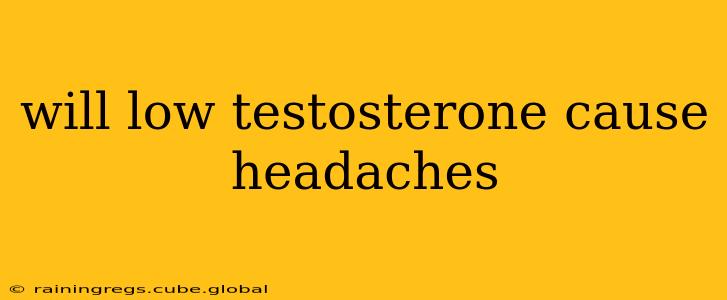Low testosterone, also known as hypogonadism, can affect many aspects of a man's health and well-being. While not directly listed as a common symptom, some men report experiencing headaches in conjunction with low T. However, the relationship isn't straightforward, and it's crucial to understand the complexities before jumping to conclusions. This article will explore the potential connection between low testosterone and headaches, examining the possible links and addressing frequently asked questions.
Can Low Testosterone Directly Cause Headaches?
The answer isn't a simple yes or no. There's no definitive scientific consensus directly linking low testosterone levels to headaches. Testosterone plays a significant role in various bodily functions, but headache mechanisms are complex and involve many factors beyond hormonal influences. While low T doesn't directly cause headaches in the way that, say, a migraine might, indirect effects could potentially contribute.
Could Low Testosterone Indirectly Contribute to Headaches?
Low testosterone can lead to several health issues that could indirectly trigger or worsen headaches. These include:
- Sleep disturbances: Low T is often associated with insomnia and poor sleep quality. Sleep deprivation is a well-known headache trigger.
- Increased stress and anxiety: Low testosterone levels have been linked to increased feelings of stress, anxiety, and depression, all of which can trigger or exacerbate headaches.
- Fatigue and lethargy: The persistent tiredness associated with low testosterone can lead to tension headaches.
- Other hormonal imbalances: Low testosterone might be a symptom of a broader hormonal imbalance, affecting other hormones that could impact headache frequency or severity.
What Other Conditions Can Cause Headaches Besides Low Testosterone?
Many factors can cause headaches, and it's crucial to rule out other possibilities before solely attributing them to low testosterone. These include:
- Migraines: These severe headaches are often accompanied by nausea, vomiting, and sensitivity to light and sound.
- Tension headaches: These are the most common type of headache, characterized by mild to moderate pain, often described as a tight band around the head.
- Cluster headaches: These are severe headaches that occur in clusters, with multiple headaches happening over a period of days or weeks, followed by periods of remission.
- Sinus headaches: Pain typically localized around the sinuses, often caused by sinus infections.
- Medication overuse headaches: These develop from the overuse of pain relievers.
How are Low Testosterone and Headaches Diagnosed?
Diagnosing both low testosterone and the underlying cause of headaches requires a comprehensive medical evaluation. This typically involves:
- Blood tests: To measure testosterone levels and assess overall hormone balance.
- Physical examination: To evaluate symptoms and rule out other potential causes of headaches.
- Neurological examination: In cases of severe or unusual headaches, a neurological exam may be necessary.
- Headache diary: Keeping a detailed record of headache frequency, duration, location, and associated symptoms can be helpful for diagnosis.
Can Testosterone Replacement Therapy (TRT) Help Headaches?
If low testosterone is confirmed and contributing to other symptoms like sleep disturbances or increased stress, TRT might indirectly alleviate headaches. However, TRT is not a guaranteed cure for headaches. The primary goal of TRT is to address the underlying testosterone deficiency, and any positive impact on headaches is likely an indirect consequence. Always discuss TRT with a doctor to determine if it's appropriate and safe for you.
When Should I See a Doctor About Headaches?
Consult a healthcare professional if you experience:
- Sudden, severe headaches: Especially if accompanied by fever, stiff neck, vision changes, or numbness.
- Headaches that worsen over time: A gradual increase in frequency or intensity warrants medical attention.
- Headaches that interfere with daily life: If headaches significantly impact your ability to work, socialize, or perform daily activities.
- Headaches accompanied by other symptoms: Such as nausea, vomiting, fever, or neurological changes.
It's important to remember that while a connection could exist between low testosterone and headaches, it’s usually indirect. Always consult a healthcare professional for accurate diagnosis and treatment of both low testosterone and headaches. Self-treating can be dangerous, and a thorough evaluation is crucial to determine the root cause of your symptoms.
